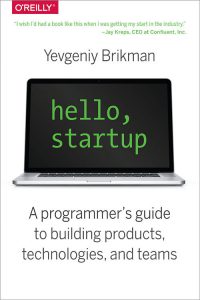Hello, Startup - 360 overview of running tech business
Some time ago, Remo Jansen recommended me to check out awesome book Hello, Startup by Yevgeniy Brikman. I finally got into it, and I need to admit that it is a gem describing startup and tech World end-to-end.
Here are my key take aways:
- Building successful company requires give or take 10 years (this is short overview why from other source).
- These 10 years are not 955 work weeks, it's 996 on the good days.
- Tip: Have a notebook to write down any idea that comes to your mind. Even the most stupid one! You will be surprised when a few years later someone turn it into the product. Someone, but not you.
- New business recipe: copy, transform, combine.
- Initial startup idea requires many iterations. Always! Yevgeniy gives a lot of simple examples including creating resume (from very raw to very nice looking).
- Doing things that don't scale is ok at the beginning to validate the idea, you can automate later. Launching business that automates something? Hire vendors that would do it manually, and once it take off hire developers who will automate it. As automation and scaling is usually much more expensive.
- Metrics to track:
- acquisition - its sources, conversions and cost
- activation - how many new users engage with the product, and why
- retention - how many users stays after week, month, year...
- referral - channels and conversions
- revenue - month over month, year over year, CLV (Customer Lifetime Value)
- magic number - e.g. once facebook user connects with 7 friends within 10 days they usually become highly engaged, for twitter it takes following 30 people, and for Slack - exchanging 2000 messages (how to find insights like that by Andrew Chen)
- Data-Driven Development: idea -> develop MVP -> A/B Test -> Release (requires well defined metrics and measurement tools)
- Distribution channels for startups:
- word of mouth
- build better product
- great customer service
- build viral loops into your product
- marketing
- advertising
- PR and media
- SEO
- social media
- inbound marketing - e.g., publishing useful blog posts, like Facebook engineering blog
- sales
- automated - website checkout
- inside - sales representatives at the store, or by phone
- outside - "traveling salesmen"
- branding (Apple = "Think different", Red Bull = extreme sports, Nike = great athletes)
- word of mouth
- Use OSS and buy SaaS solutions for everything, but your competitive advantage ("secret sauce").
- Align tech stack with current market trends (in 2020 it's much easier to hire React developer than Backbone developer).
- Against Joel Spolsky opinion that rewrite is worst thing you can do, these days startups often change technologies (Twitter migration from RoR to Scala, Coursera moved from PHP to Scala or AirBnB is moving from React Native to pure native). Thus do not worry too much about stack choice - treat it as it will eventually be rewritten. Microservice architecture over monolith helps with that!
- Keep code clean! Good naming, conventions, DRY, SRP, tests. It can bite even within first year. Especially because at Startup you will be constantly evolving existing code!
- Company culture (mission and values) helps to avoid processes. People can trust each other to do the right thing.
- First 5-10 hires can kill or make your company successful. Look for: "smart and get things done", culture fit, communication skills and "would you be ok reporting to them?".
This book is GOLD! I strongly recommend everyone to read it. Besides awesome 360 overview of startup World, there is a lot of great insights into everyday developer's life. It's worth to remember that pretty much every tech company is a startup...just in different phase.
If you are still in doubt, this book has 4.9/5 rating on Amazon and 4.45/5 on goodreads!
There is one quote from the book that I would like to finish this summary with:
I started asking, "What are the important problems of your field?" And after a week or so, "What important problems are you working on?" And after some more time I came in one day and said, "If what you are doing is not important, and if you don't think it is going to lead to something important, why are you at Bell Labs working on it?"
Richard Hamming, You and Your Research
